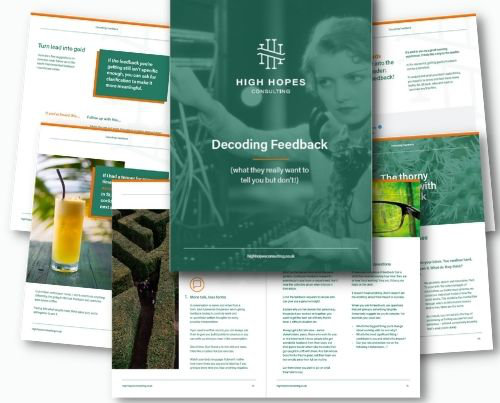Are you a 'Leadsplainer'?
Are you a 'Leadsplainer'?
Nicola Hopes

“Argh! I didn’t even know I did it!” came the anguished sigh from my coaching client Kate.
Following feedback from her team, it had just dawned on her she was a ‘Leadsplainer’ - a phrase I coined last year [© High Hopes!].
I described ‘Leadsplaining’ as:
“‘Helping’ less experienced team members by re-phrasing or repeating what they’ve said because you think that’s the way to get them heard or because you think you’ll make the point better.”
The concept has come up in many conversations since. Some people are on the receiving end of it. Others, like Kate, have had the terrible realisation they do it. And some are spotting it in their peers or senior leaders.
I didn’t realise what I’d started… so I’ve decided to do a deeper dive, just in case you might be a Leadsplainer too...
Leadsplaining isn’t the same as helping
Most Leadsplainers come from a good place – they want to help their valued team members raise their profiles, get heard and get ahead. But when you Leadsplain, you aren’t really helping at all.
How do you know if you’re a Leadsplainer? Well, you probably:
- Hijack that great idea by adding your own spin the minute it’s been uttered and then tell everyone it’s great
- Re-state another’s point ‘in a better way’ rather than build on it
You may think you’re showing that you welcome ideas from your team. But they just think you’re hogging the limelight.
You may think you’re showing great listening skills. They just think you’re patronising and dominating the conversation.
My super simple tip to avoid Leadsplaining? Write your point down first. Because there’s something about seeing it in black and white that allows you to step back.
When you’re in the throes of a discussion, responding to an idea (especially from a less experienced colleague), write down the point you’re about to make.
Then ask yourself. Am I making a substantially new point or is it just the same? If it’s the same, draw a line through it and nobody need know. If it’s a new point, go for it.
If you then have feedback for the idea sharer on how they could have made it punchier or more impactful, share it with them after.
Remember: even if your intention is good, they won’t thank you for ‘helping’ them to land their idea. Let them learn how to land it themselves. Then they’ll thank you.

